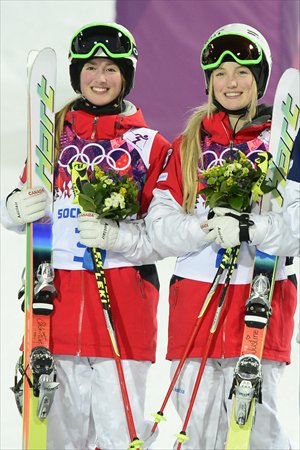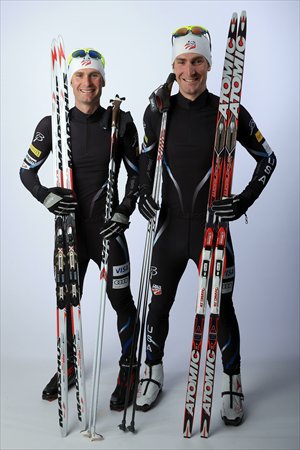HOME >> SPORTS
Sister act makes Games family affair
Source:AFP Published: 2014-2-15 0:38:01

Canada's Chloe Dufour-Lapointe (left) and sister Justine on the podium during the women's Freestyle Skiing Moguls Flower Ceremony in Sochi on February 8. Photo: CFP
The Winter Olympic Games may be a multi-billion dollar enterprise reaching every corner of the globe - but for many the Sochi Games are a strictly family affair.
There are Dutch speed skating twins, three Canadian freestyle skiing sisters, another three Swiss siblings in the biathlon and a father-and-son combination in ice hockey among many other family groups.
Not content with reaching the moguls final all together, the Dufour-Lapointe sisters made off with gold and silver at the Rosa Khutor Extreme Park.
It was 19-year-old Justine, the youngest of the three, who triumphed - and she admitted
she had been inspired by her siblings.
"I saw my sisters in the World Cup and I watched Chloe (who won silver in Sochi) in Vancouver.
"So I decided I wanted to train hard. I have always been a competitive tiger. I take after my dad. It's how I grew up so it's normal."
Proud father Yves said the success was partly down to strong "family values" and mum Johane said sisterhood has always come first.
"At times, one sister would be happy for her high result, but we would try not to make them feel better than the others. We consulted a psychologist," she said.
"We wanted to treat all the girls equally. They are first and foremost sisters. Sometimes they fall out, but now they are mature enough to handle themselves."
And the sisters are not the only family threesome at the Games.
Short track skater Park Se-yeong of South Korea is in Sochi alongside big sisters Park Seung-hi, also a short track skater, and speed skater Park Seung-ju.
And the Swiss Gasparin sisters - Selina, Elisa and Aita - are among seven sibling combinations competing in biathlon.
Elsewhere, the Dutch Mulder twins, Michel and Ronald, took gold and bronze in the men's 500 meters speed skating event.
"Of course the perfect scenario would be for me to win gold and my brother after me," said Ronald.
"But I'm really happy I made it to the podium."

Bryan Fletcher (left) and brother Taylor Photo: CFP
Sibling rivalry
US Nordic combined brothers Bryan and Taylor Fletcher admit there is an edge when they compete but say they also look out for one another.
"There's definitely sibling rivalry, but we have each other's back and work together to try to get the best result for both instead of one-up on each other," said Bryan, the older by four years.
"I will try to give him tips but he doesn't need too many," Taylor said. "Like how to race the rhythm of the course and stick behind someone on the downhill so you can slingshot past them."
US-born ice dancers Cathy Reed and brother Chris are competing for Japan in Sochi.
Born in Michigan, the brother-sister duo began their ice dance career competing for the US but later switched to representing the country of their mother's birth.
"The Japanese fans have been so supportive of us," Chris Reed said. "We want to honour that support with our skating. We want to give the support they have given us back to them."
At the Vancouver Games there were three Reed siblings competing - with younger sister Allison Reed representing Georgia. She has since switched both partners and countries to Israel but is not competing.
In the blood
Veteran Russian luger Albert Demchenko, who won silver on February 9 in his seventh Winter Games, had hoped to compete alongside his daughter, Viktoria, but those hopes were dashed when the 18-year-old failed to qualify for the national team.
But Slovenian ice hockey head coach Matjaz Kopitar is at the Olympic Games alongside his son Anze - the only player from the country in the National Hockey League.
"He was always pushing himself. He had good genes, worked hard and became a good hockey player," said Matjaz, remembering his son as a young boy.
With brothers David and Marcel Rodman also playing an important role for Slovenia, the coach said the key to success at the Games was creating a family feeling.
"We must be like the big family off the ice that we are. And on the ice we need to be more than 100 percent."
Posted in: Feature, Olympics, Winter Sport